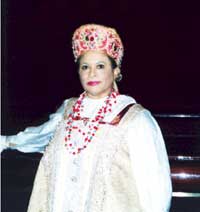|

Beverly
Withers: One Woman’s Journey To The Opera
By
Marie Holmes
Beverly
Withers, a soprano in the Metropolitan Opera Chorus, has been
making music for as long as she can remember. She began taking
piano lessons at the age of seven, and “practicing was always
a delight.” Since the piano stood in the family living room, well
within everyone’s earshot, Withers’ family often had to force
her to stop practicing. “I actually remember the day that
they had to peel me off the piano bench,” jokes Withers. Her love
of music soon blossomed into what Withers herself describes as
a “driving, relentless urge to sing.”
Withers’ early repertoire included mainly gospel and spiritual
songs. “Some of the fondest memories I have of my youth are of
singing in my church choir.” By the age of 17, Winters was playing
the piano and the organ at her church as well as serving as choir
director. She also sang in a local rock and roll group.
While the church provided her with certain outlets, musical opportunities
in Somerville, NJ were limited. “I grew up in a blue-collar town
where there was actually no exposure to classical music at all,”
describes Withers, “so people really didn’t know where I could
take my
talent.”
Withers married and pursued a career in business, but soon realized
that “something was missing.” She credits a number of mentors
and role models for leading her to a career in classical music.
Alfredo Filipigni of the New Jersey State Opera “had such confidence
in my ability,” recalls Withers. “He was influential in getting
me to study seriously.” Withers also studied with Dorothy Maynor,
a famous recital artist who turned to the concert circuit because
racial barriers prevented her from performing in opera companies,
even though she had learned a hundred operatic roles. She describes
Maynor as “very demanding–because she knew that we could deliver,”
and says that she was “inspiring in every respect.”
Withers also admired artists such as Leontyne Price and Marian
Anderson, “for their voices and their dignity.”
The hectic lifestyle of a solo singing career was not a possibility
for Withers at this point in her life. “I had been married, and
I found myself a single mother; the logical career option for
me was the chorus of the Metropolitan Opera. That year, fortunately
for me, there was a soprano opening.”
“Having
to support my family was the most important thing to me and that
was a great obstacle,” explains Withers, who considers herself
lucky to be counted among the small number of musicians who make
a living with their art.
“I
feel very proud and privileged to have been a member of the Met
chorus for the past 20 seasons, and I will continue to give it
my all until the time I retire, at which point,” she adds, “I
would like to mentor some younger singers.”
Withers says that before becoming a mentor she would like to study
vocal pedagogy, for she believes that music teachers have a great
responsibility in shaping a student’s voice– “that fragile and
precious gift that God gave them.”
Her advice to young students of music and other subjects, is “to
learn as much as you
can. Never stop asking questions of those with the knowledge to
help you.” With a wealth of community and junior colleges, state
schools and scholarship programs, Withers believes that “education
is affordable to everyone.” She urges students to “stay in school
and find a way to go to college. “There is a way for you.”
Withers would advise young musicians to join as many musical organizations
as possible, to study an instrument such
as the piano, and, of course, to find a
mentor. #
Education Update, Inc., P.O. Box 20005, New York, NY 10001. Tel:
(212) 481-5519. Fax: (212) 481-3919. Email: ednews1@aol.com.
All material is copyrighted and may not be printed without express consent of
the publisher. © 2001.
|

